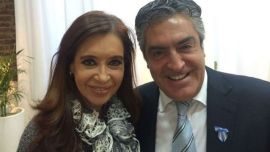United States said Tuesday it is "confident" that it will have the votes to win next week's vote for the presidency of the Inter-American Development Bank (IDB).
Washington has nominated Mauricio Claver-Carone, an advisor to President Donald Trump, amid uncertainty from nations inside and outside Latin America.
The Acting Undersecretary of State for the Western Hemisphere, Michael Kozak, on Wednesday expressed certainty that Claver-Carone would be elected on September 12 to head the IDB, the main source of financing for development in Latin America and the Caribbean.
"We are quite confident that this will be the case," Kozak said, during a telephone press conference in which he assured that the Trump administration does not foresee "any kind of retaliation" for countries that oppose its candidate.
"We are not threatening anyone. That is not the way we handle ourselves," he said.
The election of the successor to Luis Alberto Moreno, who has held the position since 2005, is scheduled for a virtual meeting on the second weekend of September, to which the 48 members of the IDB are summoned.
Argentina has proposed Strategic Affairs Secretary Gustavo Beliz for the post.
Kozak said Washington is counting on winning quorum for the appointment. For this, it has to gather an absolute majority of the members (at least 25), an absolute majority of the regional members (at least 15), and have at least 75 percent of the voting power of the countries, which depends on the capital subscribed by each one.
Regarding the election itself, the United States –– the main shareholder of the IDB with 30 percent of the voting power –– also foresees that Claver-Carone will have the necessary support.
"All you need to do is look at the countries that have publicly pledged to support him. If they vote the way they say they are going to vote, he has a large majority of the countries in the region. He also has a large majority of the weighted participation," Kozak said.
"Twisting their arm"
In a nod to Claver-Carone, the United States and 16 countries in Latin America and the Caribbean rejected a proposal two weeks ago to postpone the vote, calling on nations comply with the date decided by the Executive Board of the Bank at the end of July.
Argentina, Mexico, Costa Rica and Chile, however, spoke in favour of postponing the election, claiming that the context of the pandemic prevents a face-to-face vote that they consider better to define the future of the institution.
This claim was joined by the head of diplomacy of the European Union (EU), Josep Borrell, who recommended it to the European member countries of the IDB .
Other discordant voices were those of prominent ex-presidents from Latin America and Spain, who last week accused Trump of wanting to "impose" his candidate, insisting on the need to postpone an election that they said "would lack legitimacy" for not respecting the "historical consensus" that the presidency of the IDB is occupied by a Latin American.
But Kozak dismissed this offense.
"If we had a large number of countries that did not want to do this and we were twisting their arms, I would say that it is fine; they are right. But there are less than a handful of countries that ask for a delay and cannot express a decent reason why it makes sense to do so," he said.
Kozak said the same countries that are now asking to pass the election for six months from now, when the next Assembly of the IDB is scheduled, did not oppose the vote scheduled in September when the board addressed the issue in July.
Figure of "renewal"
Kozak noted that institutions such as the African Development Bank carried out virtual voting sessions without problems and rejected the argument that the president of the IDB is traditionally someone born in Latin America, questioning why North America or the Caribbean should be sidelined.
Former presidents of the IDB had dual citizenship, he recalled without naming them. Moreno is a Colombian born in the United States.
Kozak defended the nomination of Claver-Carone, a Cuban-born lawyer who currently sits on Trump's National Security Council and is known for his tough stances towards Cuba and Venezuela. It represents a true renewal movement.
"Mauritius represents a new generation of innovative thinkers throughout the region who believe that the IDB can refocus its efforts on its core mandate to boost economic development," he said, considering him a figure of "renewal" and underlining that he has the support of all the "subregions".
Claver-Carone was officially nominated by the United States, El Salvador, Guyana, Haiti and Paraguay.
Kozak also noted that Claver-Carone has promised to serve a five-year term "in an institution that has had only four presidents in 60 years."
-TIMES/AFP



















Comments